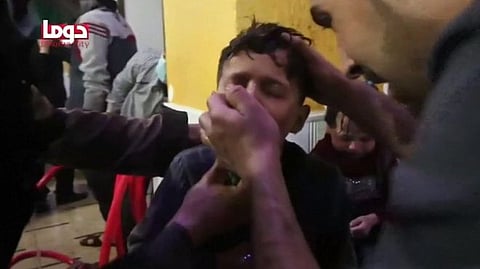Syrians families 'gassed to death' in Douma
Update: Entire families killed after suspected gas attack on Syria's rebel town of Douma; rescuers allege toxic gases were used

BEIRUT: At least 70 people were killed after air strikes on Syria's rebel town of Douma, a monitor said, as rescuers alleged that toxic gases were used.
BBC reported that a suspected toxic gas attack was carried out by the Syrian government forces. The figue was given by rescuers and medics in Douma, the last rebel-held town in Eastern Ghouta.
Volunteer rescue force the White Helmets tweeted graphic images showing several bodies in a basement. It said the death toll is likely to rise.
There has been no independent verification of the reports. Syria's government has called the allegations of a chemical attack a "fabrication".
The US State Department said it is monitoring the "very disturbing" reports, and that Russia — which is fighting alongside the Syrian government — should be held responsible if deadly chemicals had been used.
History of gas attacks in Syria
"The regime's history of using chemical weapons against its own people in not in dispute," said the State Department.
It said it believed at least 40 people died, but that the toll may be far higher.
but state media quickly denied that troops had deployed chemical weapons on Douma, the last opposition-held town in the battered Eastern Ghouta enclave.
Regime forces resumed a military blitz of Douma on Friday after an apparent breakdown in negotiations between government backer Moscow and Jaish Al-Islam, the rebels that hold the town.
On Saturday, the Syrian Observatory for Human Rights monitoring group said air strikes on the northern edges of the town had left many, including five children, "suffocating and suffering shortness of breath."
The monitor told AFP it could not specify the reason for the symptoms.
Toxic gas
The White Helmets rescue teams, however, said Douma had been hit with toxic gas.
"Cases of suffocation between the civilians in the residential neighbourhood in the city Douma after it was targeted by poison gas chlorine," it wrote on its English-language Twitter account.
The Syrian American Medical Society (SAMS) also told AFP that medical staff they supported inside Douma had reported chlorine use.
"I spoke to one of the doctors inside the town, who told me... they received a number of wounded with symptoms from chlorine gas," said SAMS advocacy director Mohammad Katoub, based in Turkey.
Syria's regime has been accused of using toxic gas including chlorine and sarin throughout the seven-year conflict, but it has repeatedly denied the claims.
On Saturday, a government source told state media that the accusations were a "farce."
"The army, which is progressing rapidly and with determination, does not need to use any chemical substance," the source told state media.
The latest on the alleged gas attack in Syria
The Union of Medical Relief Organizations, a US-based charity that works with Syrian hospitals, told the BBC the Damascus Rural Specialty Hospital had confirmed 70 deaths.
Several medical, monitoring and activist groups reported details of a chemical attack, but figures vary and what happened is still becoming clear.
The pro-opposition Ghouta Media Center tweeted that more that 75 people had "suffocated" while a further thousand people had suffered the effects of the alleged gas attack.
'Barrel bomb dropped by chopper'
It blamed a barrel bomb allegedly dropped by a helicopter which it said contained sarin, a toxic nerve agent.
A Union of Medical Relief Organizations spokeswoman said reports on the ground suggested a much higher number of around 180 dead, but that it was hard to reach victims due to continuous shelling.
She added there were reports of people being treated for symptoms including convulsions and foaming of the mouth, consistent with nerve or mixed nerve and chlorine gas exposure.
As the allegations emerged, Syria's state news service Sana said the reports were invented by the Jaish Al-Islam rebels who remain in control in Douma.
"Jaish Al-Islam terrorists are in a state of collapse and their media outlets are [making] chemical attack fabrications in an exposed and failed attempt to obstruct advances by the Syrian Arab army," state media said.
Syrian government's record of chemical weapons use
In August 2013, rockets containing the nerve agent sarin were fired at rebel-held areas of Eastern Ghouta, killing hundreds of people.
A UN mission confirmed the use of sarin. But it was not asked to state who was responsible.
Western powers said only Syrian government forces could have carried out the attack.
In April 2017, more than 80 people died in a sarin attack on the opposition-held town of Khan Sheikhoun, and a joint inquiry by the UN and the Organization for the Prohibition of Chemical Weapons (OPCW) held the Syrian government responsible.
Activists, medics and the US say Syrian government forces dropped bombs containing toxic chlorine gas on rebel-held towns in early 2018.
The joint UN-OPCW mission is investigating the reports. It has previously found that government forces have used chlorine as a weapon at least three times during the seven-year civil war.
Douma's status
Douma is the last rebel-held town in Syria's Eastern Ghouta region, and is under siege from Russian-backed Syrian government forces.
After fresh talks between Moscow and the rebels broke down, an intense aerial and ground assault was launched on Friday.
Before negotiations failed, Jaish Al-Islam had been trying to secure a deal that would let its members stay in Douma as a local security force.
The UK-based Syrian Observatory for Human Rights, a monitoring group, said government air strikes had killed 40 civilians on Friday, and a further 30 on Saturday.
State media said six civilians had also died in rebel shelling of the capital Damascus, with 38 injured. Jaish Al-Islam denied it was responsible.
Forces loyal to Syria's President Assad have recaptured almost the entire Eastern Ghouta region through a fierce offensive that started in February.
Sign up for the Daily Briefing
Get the latest news and updates straight to your inbox



